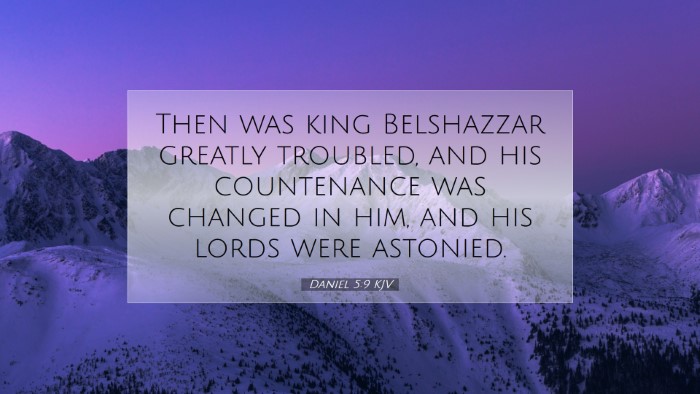Commentary on Daniel 5:9
Daniel 5:9 presents a critical moment in the Babylonian empire's history, depicting King Belshazzar's state of mind amidst divine revelation. This commentary synthesizes insights from renowned public domain commentaries by Matthew Henry, Albert Barnes, and Adam Clarke, aiming to provide a comprehensive understanding of the text for pastors, students, theologians, and Bible scholars.
Contextual Background
The setting of Daniel 5 is during a grand banquet hosted by King Belshazzar, where he defies God by misusing sacred vessels from the temple in Jerusalem. This act of sacrilege draws immediate divine attention, leading to the writing on the wall—a mysterious message that sparks fear and confusion. The verse reads:
"Then was king Belshazzar greatly troubled, and his countenance was changed in him, and his lords were astounded."
Analysis of Key Themes
- The Nature of Fear and Disturbance:
Henry notes that Belshazzar's troubled spirit showcases the psychological turmoil that follows sin and violation of divine command. His immediate reaction—contrary to the expected arrogance of a ruler—illustrates a profound spiritual disconnect occurring due to his disregard for God.
- The Reaction of the Court:
Belshazzar's lords being astounded indicates a collective confrontation with an unknown spiritual reality. Barnes emphasizes the role of the lords' reaction, suggesting it highlights the inability of human wisdom to comprehend divine messages, a theme prevalent throughout scripture.
- Divine Revelation and Human Response:
Clarke elaborates that the writing on the wall represents a direct intervention by God, meant to reveal Belshazzar's impending judgment. The king's countenance changing reflects not merely fear but also guilt—a recognition of his previous sins against the Most High.
Theological Reflections
This verse and its surrounding context invite several theological reflections:
- God’s Sovereignty:
The narrative reinforces God's absolute sovereignty over nations and rulers. Belshazzar’s demise is a stark reminder that divine judgment is inevitable for those who choose to defy God’s authority.
- The Call to Repentance:
The fear that seizes Belshazzar serves as a call to repentance. While he does not respond rightly, the confrontation with God’s judgment should inspire contemporary readers to reflect on their lives and seek reconciliation with God.
- Contrasting Responses to Divine Messages:
Henry contrasts Belshazzar’s reaction with the response of Daniel. Where Belshazzar falters in fear, Daniel remains steadfast in faith. This emphasizes the importance of spiritual courage when faced with divine revelation.
Practical Applications
For pastors and theologians, Daniel 5:9 offers profound practical insights:
- Understanding Human Fallibility:
Leaders and congregants alike are reminded of the fallibility of human wisdom confronted with divine matters. Building a community that seeks understanding through prayer and scripture can help mitigate the panic that arises from ignorance.
- Encouragement in Crisis:
Believers facing crises can take heart from Daniel’s example, who stands firm in the face of fear. Pastoral counseling can draw upon this narrative to encourage faith over fear in the midst of life’s challenges.
- Exhortation to Live Righteously:
Henry’s commentary highlights the holiness of God that demands righteous living. This serves as an exhortation for congregations to live in a way that honors God, reminding them of the reality of divine judgment.
Conclusion
Daniel 5:9 encapsulates a pivotal moment of terror leading to divine revelation. The combined insights from Henry, Barnes, and Clarke illuminate the text's rich theological, practical, and existential dimensions. Their reflections serve as a warning against pride and a call to humility before God, urging all to consider the weight of their actions and the immediate call to righteousness within their personal and communal lives.


